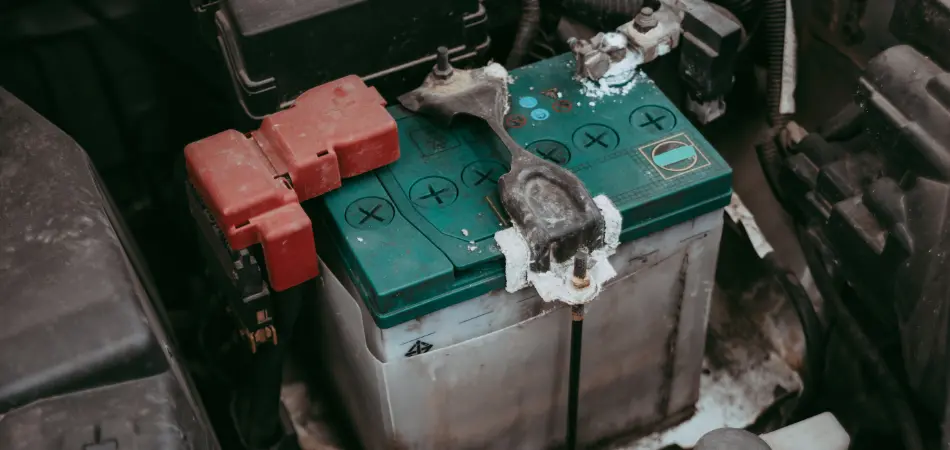Why Your Car Battery Is Swelling & What to Do

Is your car battery swollen like a balloon? This alarming sight can signal serious underlying issues. Knowing what causes car battery swelling and what to do can save you from potential hazards and costly repairs.
By the end of this post, you’ll understand:
- What types of batteries are prone to swelling
- The meaning behind a swollen battery
- Whether a swollen battery is safe to use
- Symptoms to watch for
- Steps to deal with a swollen battery
Types of Batteries Prone to Swelling
The batteries most vulnerable to swelling include:
Lead-Acid Batteries
Commonly used in cars, lead-acid batteries can swell due to overcharging or internal short circuits. When these conditions occur, gas builds up inside the battery.
Lithium-Ion Batteries
Lithium-ion batteries, primarily found in laptops and modern gadgets, can swell if overcharged, exposed to high temperatures, or damaged. Chemical reactions within the battery produce gases that cause swelling.
Nickel-Cadmium (NiCad) Batteries
NiCad batteries can still be found in older devices. These batteries can swell due to overcharging or deep discharge cycles, resulting in trapped gases within the cell.
What Battery Swelling Means
Battery swelling is a sign that something is amiss inside the battery. It usually indicates:
- Overcharging: A battery charged beyond its capacity generates excess heat and gas. Over time, this gas accumulates and expands the battery casing.
- Internal Short Circuit: Manufacturing defects, physical damage, or wear and tear can cause an internal short circuit. This condition bypasses the battery’s protective features, resulting in overheating and gas build-up.
- Aging: Old batteries lose their ability to hold a charge while internal components deteriorate and produce gases that lead to swelling.
- High Temperatures: Exposure to high temperatures can accelerate a battery’s chemical reactions and create more gas than the battery can vent.
Is a Swollen Battery Safe?
No.
- A swollen battery poses a potential fire hazard.
- Expanding gas can rupture the battery’s casing and release toxic chemicals.
- In extreme cases, the battery may even explode.
Symptoms to Watch for
Common warning signs include:
- Bulging or distorted shape
- Difficulty fitting into its compartment
- Leaking fluids or strange smells
- Reduced power and performance from your car
- Corrosion on the battery terminals
- Difficulty starting your car, especially in cold weather
Steps to Deal with a Swollen Battery
In some cases, you may be able to handle the issue yourself. However, if the swelling is extreme or there are signs of damage, seek professional assistance.
1: Power Down
Turn off your device or vehicle immediately to prevent further damage.
2: Take Safety Precautions
Wear protective gloves and eyewear. Swollen batteries can leak harmful chemicals.
3: Disconnect the Battery
Carefully disconnect the battery from your device or vehicle. Use insulated tools to avoid accidental short circuits, and always disconnect the negative terminal first and then the positive.
4: Inspect for Damage
Check the battery for visible signs of damage, such as cracks, leaks, or severe bulging. If the battery’s casing is compromised, handle it with extreme care.
5: Dispose of Properly
Do not attempt to puncture, crush, or incinerate a swollen battery; these actions can release hazardous materials. Instead, seal the battery in a non-conductive container and take it to a certified recycling or disposal facility that can manage hazardous waste.
6: Replace with a New Battery
Verify that your new battery is compatible with your device or vehicle. Follow the manufacturer’s guidelines for installation and securing all connections. Observe proper terminal placement by connecting the positive terminal first, followed by the negative.
7: Monitor Usage
After replacing the battery, monitor its performance and check for any recurring signs of swelling or malfunction. Maintain routine maintenance checks to ensure longevity, including avoiding overcharging and excessive exposure to high heat.
FAQs About Car Battery Swelling
Q: What causes car battery swelling?
Overcharging, internal short circuits, or exposure to high temperatures are common causes of car battery swelling.
Q: Can I fix a swollen battery?
No, swollen batteries cannot be repaired. They must be replaced to ensure safety.
Q: How can I prevent battery swelling?
- Avoid overcharging
- Keep batteries at moderate temperatures
- Use chargers that match your battery specifications
Q: Is it normal for batteries to swell?
No, battery swelling is not normal and indicates an underlying issue.
Q: Can a swollen battery damage my device or vehicle?
Yes, using a swollen battery can cause further damage to your device or vehicle and pose safety risks.
Q: How often should I check my car battery for signs of swelling?
We advise inspecting your car battery every six months, particularly before and after season changes when temperature variations can affect battery performance.
Q: What should I do if my car battery is swollen but still functional?
Replace it immediately, even if it still works. Using a swollen battery poses potential safety hazards, such as leaks or explosions.
Q: Can temperature fluctuations cause a car battery to swell?
Yes, large temperature fluctuations can impact the chemical balance within a battery. Always protect your vehicle from extreme temperatures when possible.
Q: Are there specific battery brands known for being more prone to swelling?
Reputable battery brands typically ensure higher quality and safety standards, but no brand is immune to potential swelling. Always choose batteries from trusted manufacturers, and follow proper use and charging guidelines.
Q: Can I test for a battery’s propensity to swell before it happens?
There’s no direct test to predict battery swelling. However, routine checks on battery voltage and physical condition can reveal early signs of issues. To mitigate risks, always ensure that your charging systems are functioning correctly.
More Articles

0 Comments